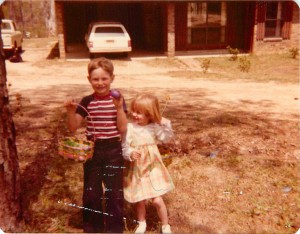 Holding the basket in my four year old hand, gripping the twisted straw handle, I saw it. At the base of a tree, set in the crook of the roots, a yellow-dyed egg peaked out. Only a few feet away, I started forward at full speed, running in my white patent leather shoes. As I came to a quick stop in front of the egg, little hand reaching, the egg is snatched away by another hand. A bigger boy shoves the egg in to the cellophane grass lining his basket, already full of eggs. My mouth hangs open and I gasp before crying out, “Hey, I saw it first! That’s mine!” He turns, beginning to run and proclaims, “No, I saw it first!” I look around. The magical veil of the moment lifted. The front lawn at the country club is littered with children carrying baskets. Realizing that my window of opportunity is closing, I swallow my upset and move with determination and a little fear. I look around me, so quickly that I don’t see any eggs. Then I look again- there’s another egg. A bright pink egg tucked into the dried pine needles at the base of a young tree. I take only a step before it’s gone. The basic components of this same scene replay a few more times before I run crying to my mom, nose running. My basket is so light and keeps scratching my leg. I don’t quite remember what happens next. I believe my older brother is ‘compelled’ to ‘share’ some of his eggs with me (three eggs, two of which are completely cracked), but there’s no substitute for finding my own. The build up of the past two weeks (the Easter Bunny is coming, ‘Here Comes Peter Cottontail’) has fallen flat in less than ten minutes. Later, at home, my parents hide eggs for us. Some of my happiness is restored as we take turns hiding and finding eggs throughout the afternoon.
Holding the basket in my four year old hand, gripping the twisted straw handle, I saw it. At the base of a tree, set in the crook of the roots, a yellow-dyed egg peaked out. Only a few feet away, I started forward at full speed, running in my white patent leather shoes. As I came to a quick stop in front of the egg, little hand reaching, the egg is snatched away by another hand. A bigger boy shoves the egg in to the cellophane grass lining his basket, already full of eggs. My mouth hangs open and I gasp before crying out, “Hey, I saw it first! That’s mine!” He turns, beginning to run and proclaims, “No, I saw it first!” I look around. The magical veil of the moment lifted. The front lawn at the country club is littered with children carrying baskets. Realizing that my window of opportunity is closing, I swallow my upset and move with determination and a little fear. I look around me, so quickly that I don’t see any eggs. Then I look again- there’s another egg. A bright pink egg tucked into the dried pine needles at the base of a young tree. I take only a step before it’s gone. The basic components of this same scene replay a few more times before I run crying to my mom, nose running. My basket is so light and keeps scratching my leg. I don’t quite remember what happens next. I believe my older brother is ‘compelled’ to ‘share’ some of his eggs with me (three eggs, two of which are completely cracked), but there’s no substitute for finding my own. The build up of the past two weeks (the Easter Bunny is coming, ‘Here Comes Peter Cottontail’) has fallen flat in less than ten minutes. Later, at home, my parents hide eggs for us. Some of my happiness is restored as we take turns hiding and finding eggs throughout the afternoon.
Disappointment happens, and should happen in childhood. If we are fortunate, we have several opportunities that allow us to experience disappointments within the safety and comfort of a trusted, loving relationship with a parent or caregiver. When children have a strong, healthy relationship with a parent or caregiver, they are able to better deal with disappointments. This doesn’t mean the child will happily accept a difficult circumstance and move on instantly. No, crying and tantrums may still happen, but what that strong relationship will do is help the child build healthy coping skills so that they are better able to deal with disappointments later in life in healthy and reasonable ways.
When children are shielded, protected, or not allowed to experience disappointments they may develop unhealthy and unsustainable ways of coping. It’s OK for children to cry when they are upset or frustrated. Crying is a natural and acceptable response. Is it uncomfortable for us? Yes, but that’s OK, too. How have you learned to cope with difficult circumstances?
Here is a great resource for parents and caregivers to learn more about building strong and healthy relationships with young children: Center on the Social and Emotional Foundations for Early Learning. Resources and training modules are available to download for free.

Thank you for the good info Jessica. Happy Easter.
Happy Easter to you, Eva! Thank you for reading, and for being a strong influence on my career.
I snatch eggs from Marleys hand every day and so far no crying;). Of course they are brown chicken eggs and not pretty colors. But good info for sure! Thanks Jess!
Ha, ha, Joe, that’s a good thing. 🙂